Enthusiastic Teams Build Credible Tech Businesses During Startup Weekend New Jersey
More than 100 entrepreneurs, developers, business types and User Experience (UX) designers formed teams and brought ideas to life at Startup Weekend New Jersey (SWNJ), which was held at JuiceTank (Somerset) March 28, 2014.
After a grueling weekend of meeting criteria for business models, technical execution, design and customer validation, 13 teams took their projects to the mic for Pitch Night.
Pitching order sometimes affects judging, but on that evening one winner pitched at the start of the demos while another presented near the end. The winners, teams from Waddle and Shop Smart, received congratulations and prizes, including a guaranteed interview for TechLaunch and free coworking space at JuiceTank. Plenty of Cats was named runner-up.
Following is the list of the projects that were developed into businesses, in the order in which they were presented:
Depression Allies built a site that lets those experiencing depression ask friends for help when feeling low. The site offers a way to ask for help that won’t overwhelm friends; rather, it lets them determine how to help in small ways. “A lot of people want to help their depressed friends, but if it’s not a spouse, parent or child, it’s hard for them to figure out how to help without being overwhelmed,” said the presenter for this team.
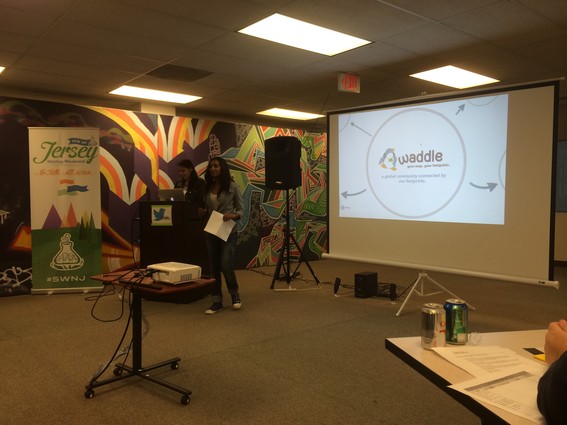
The Waddle team mapped people’s travel footprints by aggregating their social media information from sites like Foursquare, Twitter, Instagram and more. Waddle wants to be a unique player in this space, focusing on your information and your friends’ information. It also wants to make the site really easy to use. “Our goal is for you to do nothing,” a presenter said. The group conducted a Facebook survey during the weekend. Some 78 percent of those polled expressed enthusiasm for the idea, especially when the team noted that Waddle would allow users to follow the path of a group or musician (such as Beyoncé’s World Tour).
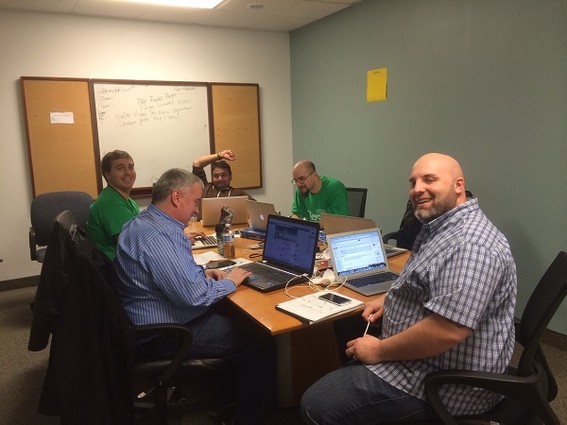
Plenty of Cats created a platform to gamify the process of adopting a pet. By using data that already existed via the Petfinder API, the team was able to incorporate thousands of cats’ photos into its game. People voted if they “liked” a cat, and the cats with the most votes moved up in the ratings. Animal shelters could then say, “This is the most popular cat in our shelter.” Dennis Harabin, speaking on the business side, said this project solved what he called a serious problem, since seven million cats are put down each year.
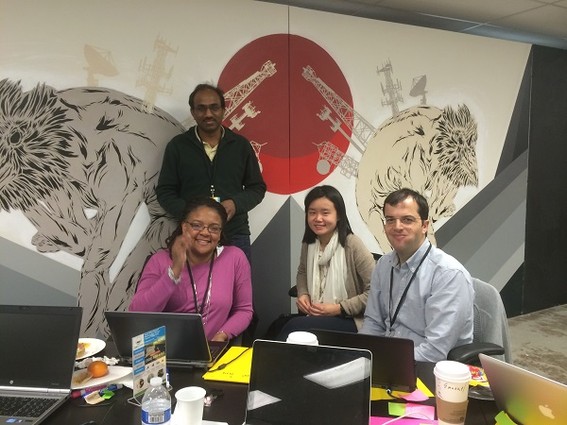
A travel application, Plan It lets users visualize their trips in seconds, making it easy for those who don’t want a generic trip to find destinations that fit their interests. “Right now it takes too long to plan [an individualized] trip … [the user] wants to discover unique activities that they can do,” in places such as New York, for example, the presenter said. Usually itineraries are generic, but this site creates personalized activity plans with specific suggested activities based on interests.
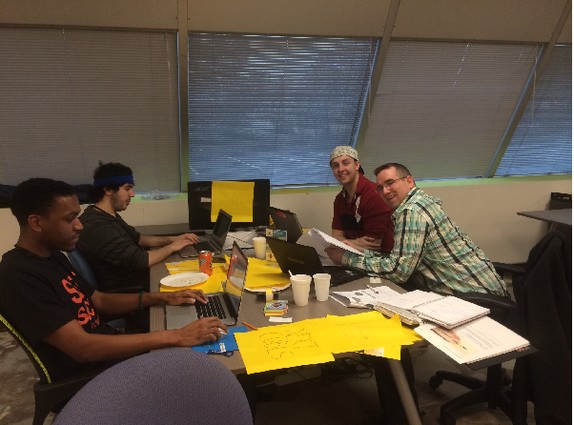
The NextCubes.co team gave a demo of a platform using clips from the ABC show “Shark Tank” to educate the next generation of investors. The team said this education is important because the JOBS Act will let everyone participate in equity-based crowdfunding. “The only problem with this is what the ordinary person knows about investing in startups … it’s complicated, confusing and 80 percent of small businesses fail within the first 18 months. Our mission is to help ordinary investors identify the 20 percent who succeed,” said a team member.
AP Test Hacker’s team was made up of Rutgers students who are trying to solve the problem of high college tuition costs. If high school students could take and do well in Advanced Placement (AP) tests, they could get credit for those courses in college and reduce the amount they have to spend on tuition. The group designed a simple user interface and gamified the process. On the back end, an algorithm identifies a user’s weaknesses and displays material to reinforce their knowledge.
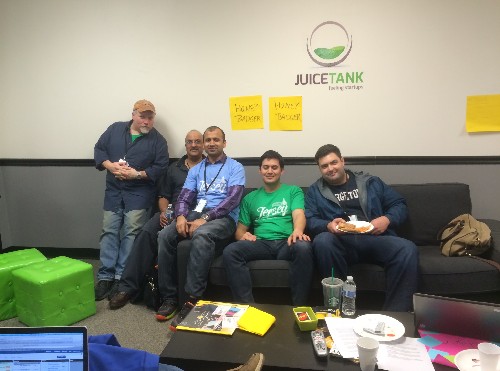
Up next, Honey Badger said it wanted to solve the problem of casually lending money to friends and family and getting that money back without embarrassment. This can be so difficult because lenders want to preserve their relationships with their friends. You can’t replace family or friends, the presenter noted. The app takes the emotion out of these interactions, reminding borrowers of their obligations in a fun, positive, nonthreatening way. One of the judges commented that he would like to see an integrity component to this app.
Unjob Market, a company that isn’t tech-based, connects workers to companies through character and purpose. The presenter told the group to think of Unjob Market as a Startup Weekend for job seekers, run by recruiters. Recruiters collect projects for potential employees to work on during the weekend. The recruiter collects a fee if a potential employer hires a weekend workshop attendee. The idea behind this business is that people need to be good employees, not just good at finding the next job. The group hopes to teach job seekers how to demonstrate that they have good character. “Character is forever. Jobs and skills come and go,” the presenter said.
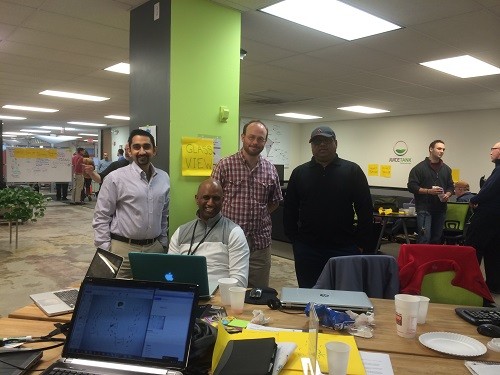
Information as a service company Glass View said it wants to bring data analytics to small businesses, especially retail companies and call centers, with its B2B product. The firm is looking to serve companies with $5 to $50 million in revenue, which are often overlooked on the market. The team said companies can upload their data sets to its cloud, and Glass View will filter and analyze the data and generate charts that visualize it. The idea is to give small businesses, which don’t have the budget for real data analytics, an alternative.
Morning Moment said it strives to make users’ first moment of the day their own by letting them wake up to content they care about. The team envisions sending photos and videos to friends and family to watch as soon as they wake up, replacing an alarm. That would put them in a positive mood to face the day, the team’s presenter said. “We also allow people to subscribe to inspirational content,” he added. In-app purchases of gift cards would provide additional revenue.
Let’s Meet 4 is a way to move introductions beyond networking events. The team wants to unlock the power of social networks by letting people schedule and create interaction-related opportunities using location-based services. If two people who want to meet for coffee sometime both happen to be in the same room at the same time, or if both happen to be going to the same city at the same time, this app will let them know that. The team has plans for an enterprise edition that can be put behind a firewall. One of the unique aspects of this app, as envisioned, is that users can tell it how long they are willing to travel to meet with any other individual.
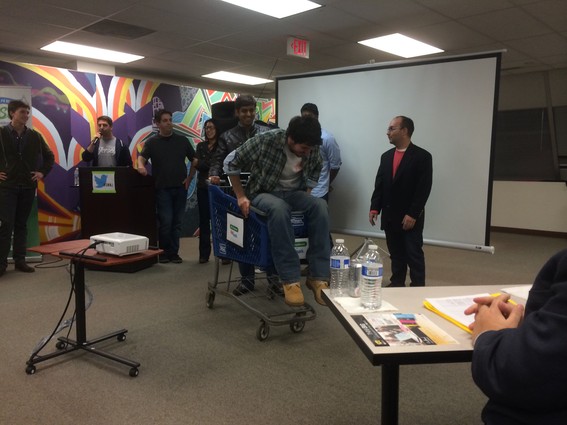
Shop Smart gave a demo of an iPad-enabled shopping cart. Users can swipe their credit cards to open an app that includes their own grocery list (which can be collaborative). The iPad enabled cart will read the items that have been added to the cart, and the iPad will keep a running total so users know how much money they are spending. The presenters said the app can alert those following gluten-free diets if they are adding an item with gluten to their cart. The app can also make suggestions, such as prompting users to buy bread if they have added sandwich-making items to their carts. “This is a win-win for the customers and for the shop. The customers get better value, and the shop sells more products,” the presenter said.
Presenters from Kwick demonstrated a way for users without a banking affiliation to exchange money using Short Message Service (SMS). Users need only text the word “register” to a phone number, and they could then use the system to pay employees, for example. The presenters sweetened the pot, offering anyone in the room who registered that day $10 in their account. “This is a better way for business owners to transfer money peer-to-peer. This has been completely untapped in the North American market,” one of the presenters said.

